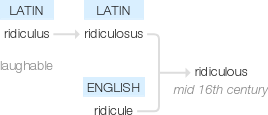Ridiculous
mid 16th century: from Latin ridiculosus, from ridiculus ‘laughable’ (see ridicule).
wiktionary
Borrowed from Latin rīdiculus(“laughable, ridiculous”); see ridicule.
etymonline
ridiculous (adj.)
1540s, ridyculouse, "worthy of ridicule or contemptuous laughter," from Latin ridiculus "laughable, funny, absurd," from ridere "to laugh" (see risible). Shakespeare and other 17c. writers sometimes spelled it rediculous.
By 18c. the sense was weakening toward "comical, amusingly absurd." The slang extension to "outrageous, scandalous" is by 1839 (see below), but its appearance in college slang late 1960s is perhaps a fresh extension. The sense of "excellent" is by 1959 in jazz slang. Related: Ridiculously; ridiculousness; ridiculosity. In the sense "concerned with jokes," Latin had ridicularius.
RIDICULOUS. This is used in a very different sense in some counties from its original meaning. Something very indecent and improper is understood by it ; as, any violent attack upon a woman's chastity is called "very ridiculous behaviour :" a very disorderly, and ill-conducted house, is also called a "ridiculous one." [Halliwell, "Dictionary of Archaic and Provincial Words," 1852]
The same use also is attested in U.S., where it was regarded as a Southern word for "outrageous" and noted as in use in 20c. in Gullah speech and among poor whites in the Ozarks.
